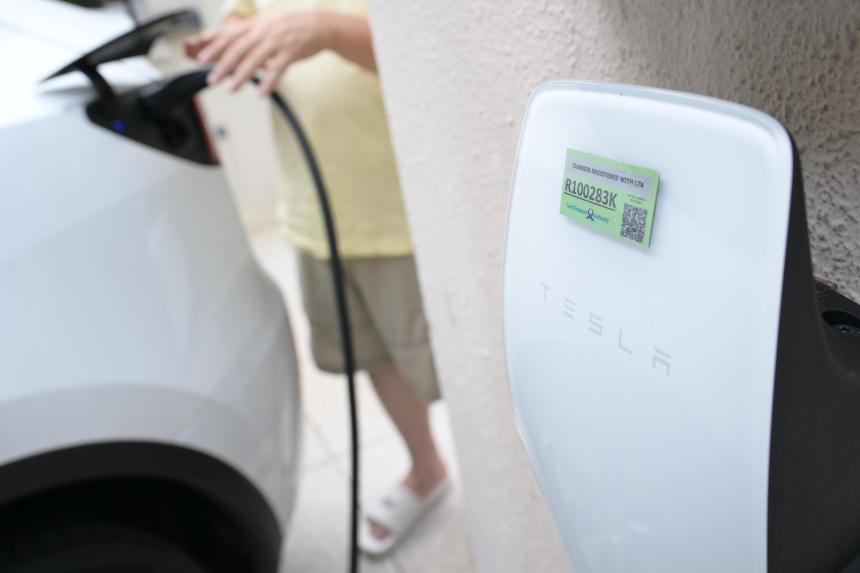SINGAPORE - Registration for existing electric vehicle (EV) chargers is proceeding apace, with about 2,000 such chargers registered with the Land Transport Authority (LTA) as at the end of March.
Half of them belong to individuals, while the rest are owned by companies like EV charging service operators, LTA told The Straits Times.
Existing chargers that comply with safety standards have to be registered by June 7, 2024, so that they can continue to be used. This is part of the law governing EV charging that came into force on Dec 8, 2023.
New chargers have to be registered before they can be used.
Registered chargers will be issued an approved label. Using an unregistered one can land the owner in jail for up to six months, a fine of up to $10,000, or both.
LTA said the intention behind the requirement is to ensure accountability for the proper use and maintenance of the chargers.
The registration process is the same for existing chargers owned by individuals and companies. A $750 registration fee is waived if the submission is made by June 7.
Landlord Teddy Liu, 59, was among the individuals who registered their home chargers.
The Tesla owner, who lives in the Newton area, received the registration label for his EV charger in early February, after he signed up on LTA’s OneMotoring website in mid-December 2023.
Back then, he was told to expect to wait up to 30 days for his application to be processed because of the high volume of applications received by LTA. Current applications are expected to be processed within 14 days.
Previously, there were no requirements for installed chargers to be registered, although EV chargers had to comply with the established technical requirement, be approved by LTA, and be installed, tested and certified by a licensed electrical worker.
This meant there was no way to know exactly where and how many chargers were in operation.
In response to a query from The Straits Times, an LTA spokesperson said: “It is important to know the number of EV chargers in Singapore and their location, to ensure accountability for the proper use and maintenance of EV chargers in Singapore. This will also offer insights on the distribution of charging points for infrastructure planning purposes.”
Registration is done on the OneMotoring website. After the required details, including photos of the charger’s installation, are submitted, the registration mark sticker will be mailed to the applicant’s address within 14 working days of a successful application. This sticker has to be affixed on the charger.
The registered chargers must also be checked periodically by qualified specialists.
Chargers installed in private landed houses will have to be inspected every two years by an equipment specialist.
Chargers installed at places such as commercial buildings and condominium carparks will be subjected to more frequent checks – twice a year by equipment specialists and annually by a licensed electrical worker.
Charger owners have to keep the records of the inspections for at least two years, in case LTA asks for them. They also have to inform LTA if the charger is no longer in use, relocated or sold.
Local EV charging service operator SP Mobility, which has over 1,100 EV chargers in nearly 400 locations, has registered more than 120 of its chargers since the registration process began in February.
Its spokesman said it is targeting to have all the chargers in its network registered by end-May.
Another EV charging service operator, EVOne Charging, which has 15 charging points, intends to register its chargers in May. The company, which also sells and installs chargers, is helping its customers with the application process.
LTA said that as at end-February, there were around 6,200 charging points. Of these, 3,600 found in more than 1,000 locations are publicly accessible.
Singapore has set a target of 60,000 charging points by 2030, of which 40,000 will be in public carparks and 20,000 in private properties.


